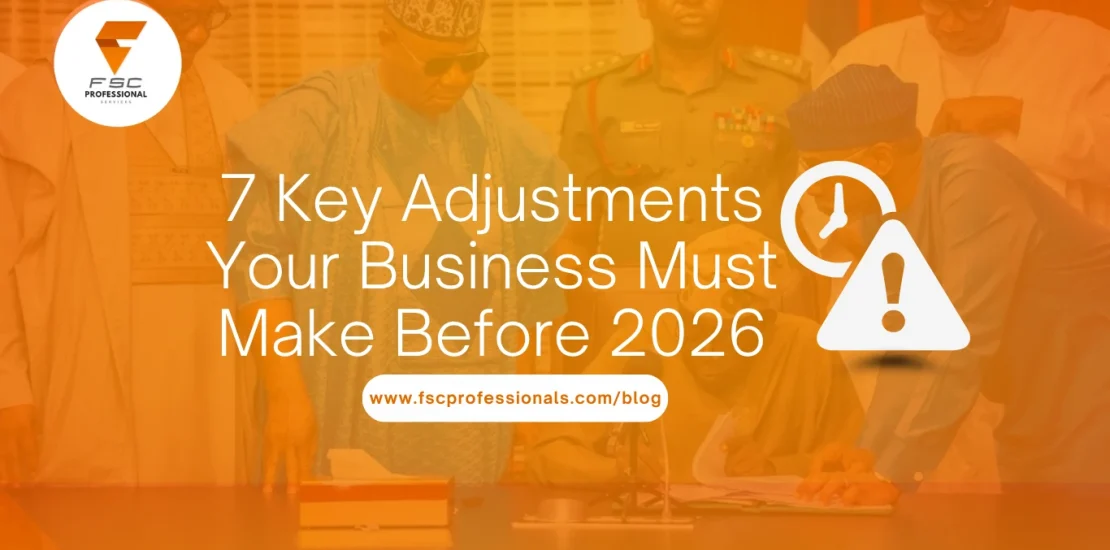- July 16, 2025
- Posted by: admin
- Category: Tax

With sweeping reforms officially signed into law, Nigeria’s tax system is entering a new chapter — and it begins in January 2026.
President Bola Ahmed Tinubu’s assent to the new tax laws marks one of the most significant overhauls in Nigeria’s fiscal history.
These reforms are designed to simplify taxation, increase compliance, and bring digital and informal sectors under the tax net. But while the government prepares to implement these changes, your business must prepare too.
At FSC Professional Services, we’re already helping our clients take the right steps — from retraining their finance teams to reprogramming their payroll systems. In this blog, we highlight 7 smart adjustments your business should make before the new Nigerian Tax Law takes effect.
1. Train Your Team, Ignorance Won’t Cut It
Let’s start with the most overlooked adjustment: education.
Your finance and HR teams must understand:
-
The new PAYE thresholds
-
The CIT exemption for businesses under ₦50 million turnover
-
What the transition from FIRS to Nigeria Revenue Service (NRS) really means
What to do:
-
Host in-house tax compliance training
-
Enrol key staff in a workshop led by tax professionals
-
Assign internal leads to monitor updates from FIRS/NRS
FSC can help with corporate training tailored to your industry.
2. Reclassify Your Business Size
Are you still considered a small business under the new law?
The CIT exemption threshold has now doubled — companies earning up to ₦50 million annually will pay zero company income tax. Many businesses that previously paid CIT may now fall into the exempt bracket.
To-do List:
-
Review your company’s turnover over the last 2 years
-
Engage a tax advisor to document your classification
-
Keep audited financials to support your exemption claim
What You Should Know About Newly Signed Nigeria Tax Reform Laws
3. Update Payroll to Reflect New PAYE Relief
Employees earning up to ₦83,000/month (₦1 million/year) will now pay no PAYE tax under the new law. Those earning between ₦1 million and ₦1.7 million will enjoy lower rates due to increased reliefs.
Steps to take:
-
Adjust your payroll structure immediately
-
Use compliant payroll software
-
Notify staff about their revised tax obligations
4. Streamline Record-Keeping, Especially for VAT
Input VAT claims have always been a grey area, especially in industries like telecoms. But with the reforms, you can only claim what you accurately record.
How to get ready:
-
Automate invoice management
-
Separate VAT-exempt and VATable goods
-
Train your team on proper VAT documentation
5. Assess Digital Tax Exposure
If your business:
-
Sells services online
-
Accepts digital payments
-
Deals in crypto or virtual assets…
…then the digital tax net is coming for you.
New tax categories include:
-
5% excise duty on digital transaction fees
-
10% tax on virtual asset services
-
Tax obligations for non-resident digital providers
Review your operations and reprice accordingly.
6. Prepare for New Audit & Dispute Resolution Structures
With the establishment of a Tax Ombudsman and a reformed Tax Appeal Tribunal, businesses can now escalate tax disputes without dragging through court.
But these structures will demand proper documentation and audit readiness.
Checklist:
-
Organise your tax documents annually
-
Prepare audit trails for capital allowances and remittances
-
Keep all FIRS/NRS correspondence safe and accessible
7. Work with a Tax Advisory Partner Early
This isn’t the time to DIY your compliance.
The new law involves changes to:
-
VAT
-
PAYE
-
CIT thresholds
-
Digital economy taxes
-
Regulatory structure (FIRS ➝ NRS)
At FSC Professional Services, we help businesses:
- Review classification and restructure entities
- Update payroll & accounting systems
- Deliver custom tax training
- Provide audit support & advisory
Final Word: This Law Will Affect You, But It Doesn’t Have to Hurt
This is more than policy — this is a shift in how tax will be calculated, collected, and enforced in Nigeria. It affects your employees, your compliance, your costs, and your future growth.
